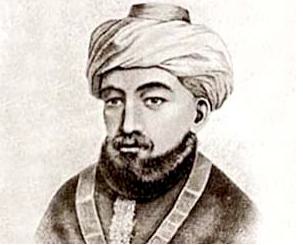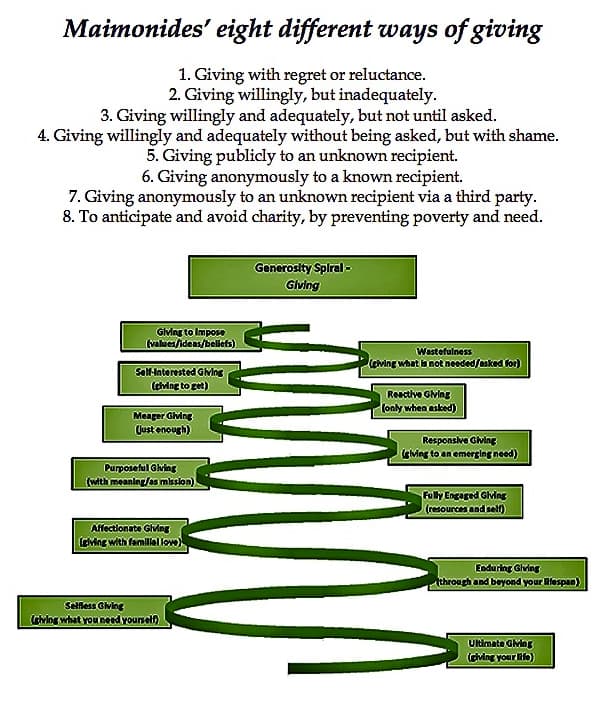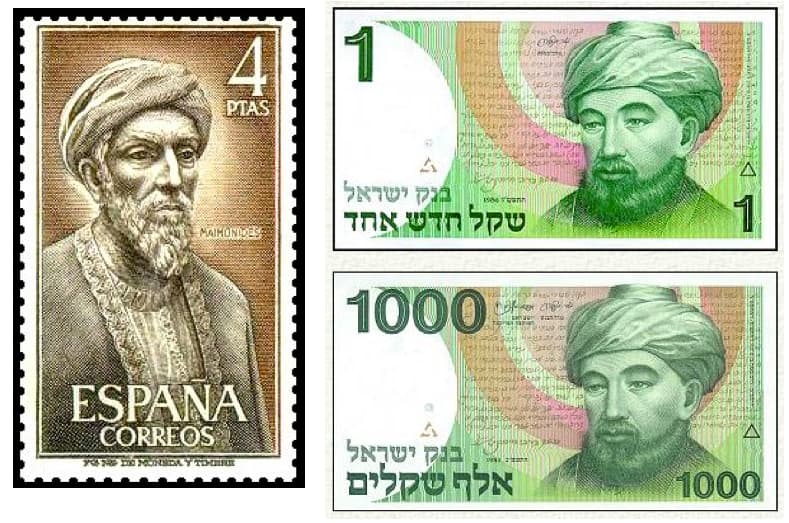Moses Maimonides: the 90-degree shift, 800 years ago
Moses Maimonides, Jewish philosopher and scholar, and his famous Eight Levels of Giving.
- Written by
- Reinier Spruit
- Added
- April 02, 2011
Moses Maimonides was a preeminent medieval Jewish philosopher and one of the greatest Torah scholars and physicians of the Middle Ages. He was born in Córdoba, Spain in 1135 and died in Egypt in 1204.
His writings on Jewish law and ethics were met with acclaim and gratitude from Jewish people as far off as Iraq and Yemen and he rose to be the revered head of the Jewish community in Egypt. Maimonides was posthumously acknowledged to be one of the foremost philosophers in Jewish history, his copious works a cornerstone of Jewish scholarship. His fourteen-volume Mishneh Torah is still the definitive codification of Talmudic law and ethics. In one of the most widely referred to sections of the Mishneh Torah he deals with tzedakah, interpreted as charity based on fairness and justice. In this Maimonides sets out his laws about giving to poor people, particularly his famous Eight Levels of Giving. This analysis was originally posted on the crowdblog on fundraising site 101 Fundraising in August 2011 by Reinier Spruit.

It’s been some years ago since I read Ken Burnett’s 89 great ideas in The Zen of Fundraising. Many, if not all of them, keep coming back to me from time to time. Lately it’s this one: make the 90-degree shift. Ken explains: ‘The 90-degree shift is nothing more complex than seeing things from your donor’s point of view rather than from your own or your organisation’s point of view.’
He illustrates this with three good old marketing sayings:
When a customer buys a quarter-inch drill, what he really wants is a quarter-inch hole.
It doesn’t matter what you want to sell. The only thing that matters is what they want to buy.
People don’t read advertisements. They read what interests them. Sometimes that includes an advertisement.
According to Ken, ‘almost nothing will make your fundraising more successful than learning to implement this simple attitude of mind.’
More recently I read the (free-downloadable) book How advertising will heal the world and your business, from Mark Woerde.
This book calls for a radical paradigm shift in branding: consumers are waiting for meaningful prosocial brands (MPBs, brands that help others by doing good) to fulfil a basic, strong and growing need: the need to live a meaningful life. MPBs go beyond conventional corporate social responsibility and use their marketing power to engage target groups and help them to help others by tackling societal issues. (Which corporate fundraiser is willing to write the book review?)
Anyway, while explaining his theory, Woerde looks at supporter motivations, feelings and reasoning using the Golden Ladder of Charity, which was developed by Moses Maimonides in the twelfth century. More than 800 years before Ken Burnett explained the 90-degree shift, there was a man named Maimonides who apparently was a star in understanding supporters.
Maimonides’ Golden Ladder of Charity shows different ways of charitable behaviour. Although his work refers to tzedakah, which in Judaism refers to the religious obligation to perform charitable and philanthropic acts, you can see a lot of similarities with current voluntary philanthropic behaviour of our supporters.

The eight different ways of giving are
- Giving with regret or reluctance: a gift of the hand and not of the heart.
- Giving willingly, but inadequately to the distress of the sufferer.
- Giving willingly and adequately, but not until we are asked.
- Giving willingly, adequately, even without being asked. But by personally giving it to the sufferer it also excites the painful emotion of shame in him.
- Giving publicly to an unknown recipient.
- Giving anonymously to a known recipient.
- Giving anonymously to an unknown recipient via a third party.
- ‘Lastly the eighth and the most meritorious of all, is to anticipate charity, by preventing poverty; namely, to assist the reduced brother, either by a considerable gift, or a loan of money, or by teaching him a trade, or by putting him in the way of business, so that he may earn an honest livelihood; and not be forced to the dreadful alternative of holding up his hand for charity. This is highest step and the summit of charity’s Golden Ladder.’ (Hurwitz, H. The Ancient Hebrew Sages, Morrison and Watt, 1826)

Maimonides made the 90-degree shift 800 years ago. He looked at supporters and tried to understand their behaviour, their values and reasons behind charitable giving: their point of view. It’s easy thinking about telemarketing, direct mail and legacy fundraising programmes, or being inflexible in donor recognition, but remember: that’s what we want to do and not necessarily what and how our supporters want to give.
© by Reinier Spruit, 2011
More about Moses
Moses Maimonides was born during what some scholars consider to be the end of the golden age of Jewish culture in Spain, after the first centuries of the Moorish rule. At an early age he developed an interest in the exact sciences and philosophy. He read those Greek philosophers accessible in Arabic translations and was deeply immersed in the sciences and learning of Islamic culture. Maimonides and his wife had one child, Avraham, who was recognised as a great scholar and who at the age of eighteen succeeded him as nagid (a Hebrew term meaning prince or leader) and as court physician. Maimonides is widely respected in Spain and a statue of him was erected in Córdoba in the only synagogue in that city which escaped destruction after the expulsion of the Jewish people from Spain in 1492. Although no longer functioning as a Jewish house of worship it is open to the public. He is sometimes said to be a descendant of King David, although he never made such a claim.

















